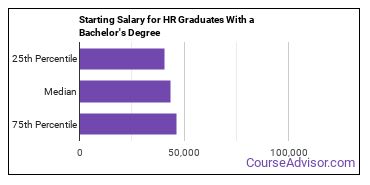Human Resource Management
Featured schools near , edit
Types of Degrees Human Resource Management Majors Are Getting
The following table lists how many human resource management graduations there were in 2020-2021 for each degree level.
| Education Level | Number of Grads |
|---|---|
| Bachelor’s Degree | 11,722 |
| Master’s Degree | 9,750 |
| Basic Certificate | 3,373 |
| Graduate Certificate | 2,089 |
| Associate Degree | 1,096 |
| Undergraduate Certificate | 479 |
| Doctor’s Degree | 278 |
What Human Resource Management Majors Need to Know
O*NET surveyed people in occupations related to HR and asked them what knowledge areas, skills, and abilities were important for their jobs. The responses were rated on a scale of 1 to 5 with 5 being most important.
Knowledge Areas for HR Majors
This major prepares you for careers in which these knowledge areas are important:

- English Language - Knowledge of the structure and content of the English language including the meaning and spelling of words, rules of composition, and grammar.
- Personnel and Human Resources - Knowledge of principles and procedures for personnel recruitment, selection, training, compensation and benefits, labor relations and negotiation, and personnel information systems.
- Administration and Management - Knowledge of business and management principles involved in strategic planning, resource allocation, human resources modeling, leadership technique, production methods, and coordination of people and resources.
- Education and Training - Knowledge of principles and methods for curriculum and training design, teaching and instruction for individuals and groups, and the measurement of training effects.
- Customer and Personal Service - Knowledge of principles and processes for providing customer and personal services. This includes customer needs assessment, meeting quality standards for services, and evaluation of customer satisfaction.
Skills for HR Majors
HR majors are found most commonly in careers in which the following skills are important:

- Speaking - Talking to others to convey information effectively.
- Active Listening - Giving full attention to what other people are saying, taking time to understand the points being made, asking questions as appropriate, and not interrupting at inappropriate times.
- Reading Comprehension - Understanding written sentences and paragraphs in work related documents.
- Critical Thinking - Using logic and reasoning to identify the strengths and weaknesses of alternative solutions, conclusions or approaches to problems.
- Writing - Communicating effectively in writing as appropriate for the needs of the audience.
Abilities for HR Majors
A major in HR will prepare for your careers in which the following abilities are important:

- Oral Expression - The ability to communicate information and ideas in speaking so others will understand.
- Oral Comprehension - The ability to listen to and understand information and ideas presented through spoken words and sentences.
- Written Comprehension - The ability to read and understand information and ideas presented in writing.
- Written Expression - The ability to communicate information and ideas in writing so others will understand.
- Speech Clarity - The ability to speak clearly so others can understand you.
What Can You Do With a Human Resource Management Major?
Below is a list of occupations associated with HR:
| Job Title | Job Growth Rate | Median Salary |
|---|---|---|
| Business Professors | 18.0% | $83,960 |
| Compensation and Benefits Managers | 5.1% | $121,010 |
| Compensation, Benefits, and Job Analysis Specialists | 8.4% | $63,000 |
| Human Resources Managers | 9.0% | $113,300 |
| Human Resources Specialists | 7.1% | $60,880 |
| Training and Development Managers | 10.4% | $111,340 |
| Training and Development Specialists | 11.5% | $60,870 |
Who Is Getting a Bachelor’s Degree in Human Resource Management?
Racial-Ethnic Diversity
At the countrywide level, the racial-ethnic distribution of HR majors is as follows:

| Race/Ethnicity | Number of Grads |
|---|---|
| Asian | 597 |
| Black or African American | 1,550 |
| Hispanic or Latino | 1,862 |
| White | 6,308 |
| International Students | 343 |
| Other Races/Ethnicities | 1,062 |
Geographic Diversity
Americans aren’t the only ones with an interest in HR. About 2.9% of those with this major are international students. The most popular countries for students from outside the country are:
- China
- India
- South Korea
- Saudi Arabia
- Venezuela
How Much Do Human Resource Management Majors Make?
Bachelor’s Degree Starting Salary
According to 2019-2020 data from the U.S. Department of Education, students who graduated with a bachelor’s degree in HR have a median salary of $43,491 during the early years of their career. During this timeframe, most salaries fell between $40,851 (25th percentile) and $46,532 (75th percentile).

Note that some of these people may have jobs that are not directly related to a HR degree.
Salaries According to BLS
HR majors often go into careers where salaries can range from $66,790 to $121,730 (25th to 75th percentile). This range includes all degree levels, so the salary for a person with just a bachelor’s degree may be a little less and the one for a person with an advanced degree may be a little more.
To put that into context, according to BLS data from the first quarter of 2020, the typical high school graduate makes between $30,000 and $57,900 a year (25th through 75th percentile). The average person with a bachelor’s degree (any field) makes between $45,600 and $99,000. Advanced degree holders make the most with salaries between $55,600 and $125,400.
Amount of Education Required for Careers Related to Human Resource Management
Some degrees associated with HR may require an advanced degree, while others may not even require a bachelor’s in the field. In general, the more advanced your degree the more career options will open up to you. However, there is significant time and money that needs to be invested into your education so weigh the pros and cons.
Find out what the typical degree level is for HR careers below.

| Education Level | Percentage of Workers |
|---|---|
| High School Diploma - or the equivalent (for example, GED) | 5.5% |
| Post-Secondary Certificate - awarded for training completed after high school (for example, in agriculture or natural resources, computer services, personal or culinary services, engineering technologies, healthcare, construction trades, mechanic and repair technologies, or precision production) | 1.1% |
| Some College Courses | 2.6% |
| Associate’s Degree (or other 2-year degree) | 3.9% |
| Bachelor’s Degree | 49.5% |
| Post-Baccalaureate Certificate - awarded for completion of an organized program of study; designed for people who have completed a Baccalaureate degree but do not meet the requirements of academic degrees carrying the title of Master. | 6.1% |
| Master’s Degree | 17.5% |
| Post-Master’s Certificate - awarded for completion of an organized program of study; designed for people who have completed a Master’s degree but do not meet the requirements of academic degrees at the doctoral level. | 1.4% |
| First Professional Degree - awarded for completion of a program that: requires at least 2 years of college work before entrance into the program, includes a total of at least 6 academic years of work to complete, and provides all remaining academic requirements to begin practice in a profession. | 0.5% |
| Doctoral Degree | 12.0% |
Online Human Resource Management Programs
In the 2020-2021 academic year, 792 schools offered some type of human resource management program. The following table lists the number of programs by degree level, along with how many schools offered online courses in the field.
| Degree Level | Colleges Offering Programs | Colleges Offering Online Classes |
|---|---|---|
| Certificate (Less Than 1 Year) | 0 | 0 |
| Certificate (1-2 years) | 63 | 21 |
| Certificate (2-4 Years) | 4 | 2 |
| Associate’s Degree | 130 | 45 |
| Bachelor’s Degree | 189 | 69 |
| Post-Baccalaureate | 0 | 0 |
| Master’s Degree | 367 | 130 |
| Post-Master’s | 33 | 0 |
| Doctor’s Degree (Research) | 35 | 6 |
| Doctor’s Degree (Professional Practice) | 0 | 0 |
| Doctor’s Degree (Other) | 0 | 0 |
Is a Degree in Human Resource Management Worth It?
The median salary for a HR grad is $70,730 per year. This is based on the weighted average of the most common careers associated with the major.
This is 77% more than the average salary for an individual holding a high school degree. This adds up to a gain of about $616,600 after 20 years!

Top Ranking Lists for Human Resource Management
Explore Major by State
Alabama
California
District of Columbia
Idaho
Kansas
Maryland
Mississippi
Nevada
New York
Oklahoma
South Carolina
Utah
West Virginia
Alaska
Colorado
Florida
Illinois
Kentucky
Massachusetts
Missouri
New Hampshire
North Carolina
Oregon
South Dakota
Vermont
Wisconsin
Majors Related to Human Resource Management
You may also be interested in one of the following majors related to HR.
| Major | Number of Grads |
|---|---|
| Business Administration & Management | 416,590 |
| Accounting | 99,265 |
| Finance & Financial Management | 57,778 |
| General Business/Commerce | 56,042 |
| Marketing | 52,916 |
| Management Sciences & Quantitative Methods | 43,382 |
| Business Support & Assistant Services | 19,119 |
| Hospitality Management | 17,689 |
| Management Information Systems | 13,680 |
| Entrepreneurial Studies | 11,319 |
| International Business | 9,101 |
| Real Estate | 6,547 |
| General Sales & Marketing | 5,923 |
| Business/Managerial Economics | 5,667 |
| Specialized Sales, Merchandising & Marketing | 5,191 |
| Other Business, Management & Marketing | 4,822 |
| Construction Management | 3,846 |
| Insurance | 1,809 |
| Taxation | 1,547 |
| Business/Corporate Communications | 1,029 |
| Telecommunications Management | 55 |
References
*The racial-ethnic minorities count is calculated by taking the total number of students and subtracting white students, international students, and students whose race/ethnicity was unknown. This number is then divided by the total number of students at the school to obtain the racial-ethnic minorities percentage.
- College Factual
- College Scorecard
- National Center for Education Statistics
- O*NET Online
- U.S. Bureau of Labor Statistics
- Usual Weekly Earnings of Wage and Salary Workers First Quarter 2020
- Image Credit: By Arunkumar Umapathy under License
More about our data sources and methodologies.
Featured Schools
 Request Info
Request Info
|
Southern New Hampshire University You have goals. Southern New Hampshire University can help you get there. Whether you need a bachelor's degree to get into a career or want a master's degree to move up in your current career, SNHU has an online program for you. Find your degree from over 200 online programs. Learn More > |

